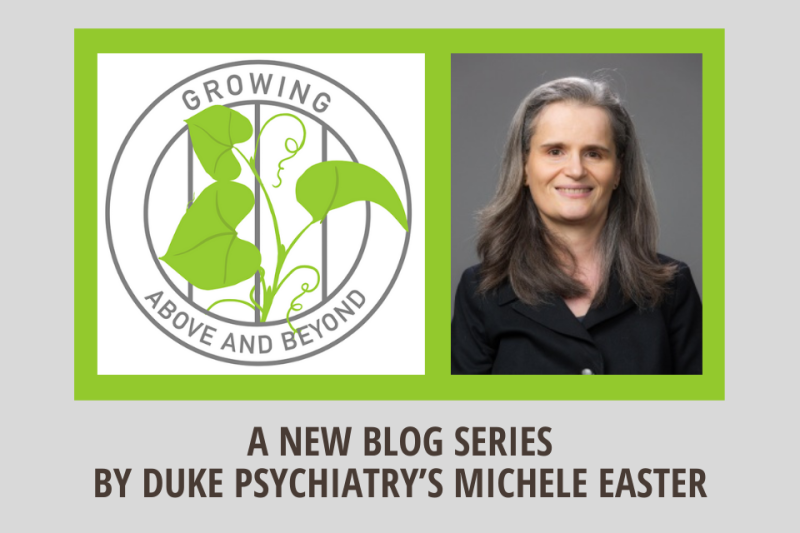
Editor’s Note: This is the first installment of an occasional series of blog posts on the Wilson Center for Science and Justice website by Duke Psychiatry & Behavioral Sciences assistant professor Michele Easter, PhD. Through the series, "Growing Above and Beyond," Dr. Easter will examine the intersection of nature and agriculture to support recovery, resilience, and community success within justice-involved communities. Dr. Easter is a member of the Wilson Center's Behavioral Health Core.
I am a sociologist whose research is intended to benefit people with mental health or substance use challenges. When I’m not at work, I spend time at my local community garden, growing food, learning about sustainable agriculture, and appreciating the natural world.
It is because of that garden I became inspired to write an occasional blog series, because I began to see a connection between my work there and my work at the Wilson Center for Science and Justice. At the Wilson Center, I work with the Behavioral Health Core – an interdisciplinary team of researchers from public health, psychiatry and sociology – on projects to reduce the risk of criminal justice involvement among populations with mental health or substance use challenges.
At the community garden, I sometimes interact with at-risk teenagers who are assigned to community service there, as well as others who find gardening beneficial for their mental health. I also keep hearing about other programs that involve nature in some way to support recovery, resilience, and community success.
In an effort to educate myself and others about the intersection of the natural world and recovery, this blog series will present information about programs that use nature to help justice-involved people to develop their potential and “grow above and beyond” their current circumstances.
For the first blog post of this series, I recently spoke with two staff members from Benevolence Farm, a transitional employment and living program for women leaving North Carolina prisons. It is located in Alamance County and the farm produces food, ingredients for body care products, and seedlings for sale.
Because of the COVID-19 pandemic, I didn’t have an opportunity to visit the farm, but Kristen Powers, the Interim Executive Director, and Alex Lombardi, Program Manager, were kind enough to get on a Zoom call with me to tell me about the program.
The farm has acres of land for growing vegetables and flowers and a house on the property. Women live on-site, are employed by the farm, and are connected to a variety of resources to help them reenter the community, based on their needs and goals (e.g., training in carpentry).
They make essential oils out of herbs and flowers for their body care product line, and soaps have been provided to people incarcerated in Orange County and prisons across North Carolina.
I appreciated Lombardi’s description of the program’s approach as “compassionate … not about ‘we’re going to change you’ but uplift and celebrate your strengths and support you as you build resilience factors.”
Examples of resilience factors include employment, education, housing, social connections, addressing mental health and other health issues, leadership skills – anything that will help people reestablish themselves in society long-term after being incarcerated.
Benevolence Farm is founded on “the premise of mercy and sincere belief in second chances,” according to its website.
“We recognize that change must come from within, but can be cultivated and inspired through a supportive, natural environment,” the site states. “Our goal is to give our participants the time and space – figuratively and literally – to make real, lasting changes.”
Farm residents endorse the value of the employment, housing, and other services in news coverage, a documentary, and in the farm’s program materials.
“I feel as though I finally have a place to call home,” one resident said. “I’ve never felt the happiness that I feel here. Working on the farm and getting to know those around me has been an amazing pleasure. I enjoy working outside, seeing everything grow, and getting closer to nature.”
One point that will stay with me, and I anticipate will be revisited in this blog series, is that growing food has very different meanings and associations depending on the person. As Powers stated, Benevolence Farm “tries to be mindful of the fact that we are a farm in the south, and prison labor and agriculture have been historically intertwined.”
For myself, as a white woman from the Midwest who works in an office, vegetable-gardening seems all positive: I participate in the miracle of seeds turning into plants and food, I engage in sustainable food production, I get exercise, I am outdoors, it feels peaceful, etc. But it would feel very different if the activity made me think of plantation or prison slavery, or if it were framed as a way to pay off my debt to society.
In the future, I hope to learn and share more with you about the history, meaning, and context of food production related to the programs and people I write about in this blog series.
This post was originally published on the Wilson Center for Science and Justice website.
NOTE: The logo for this series, included in the image for this article, was created by Pitch Story Lab, the student-run creative agency at Duke University.